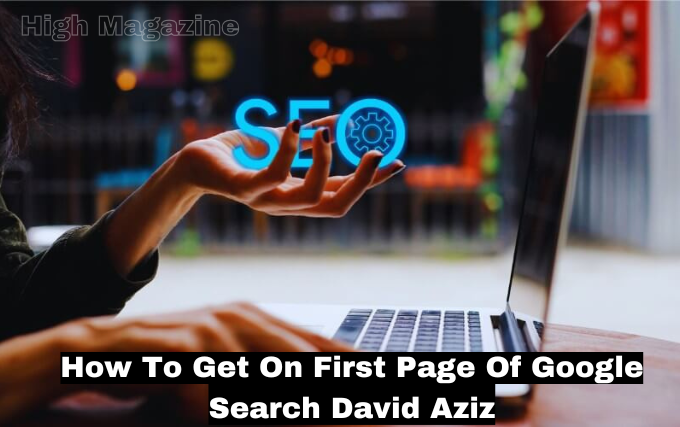Understanding how Google’s algorithm works is crucial if you want to rank on the first page of Google. Google’s search engine evaluates and ranks online pages according to a number of criteria, such as user experience, authority, and relevancy, using sophisticated algorithms. With frequent changes like Google’s Core Updates, Mobile-First Indexing, and the Page Experience Update impacting search ranks, the algorithm is always changing.
Key factors influencing search rankings include:
- Keyword Relevance: Google assesses how well a webpage’s content aligns with a user’s search query.
- Backlinks: High-quality backlinks from authoritative sites improve a webpage’s credibility.
- User Experience (UX): Google prioritizes websites that provide a seamless, mobile-friendly experience.
- Page Speed: Faster-loading pages tend to rank higher.
- Content Quality: Informative, well-structured, and original content boosts rankings.
Keyword Research and Optimization
Researching and optimizing keywords is one of the best ways to rank on Google’s first page. Google is better able to determine how relevant your material is to search queries when you use the appropriate keywords.
Conducting Keyword Research
To identify high-ranking keywords, utilize tools such as:
- Google Keyword Planner
- SEMrush
- Ahrefs
- Ubersuggest
When selecting keywords, focus on:
- Search Volume: Choose keywords that receive significant search traffic.
- Keyword Difficulty: Target low-to-medium difficulty keywords for better chances of ranking.
- User Intent: Align content with what users are looking for, whether informational, navigational, or transactional.
On-Page Keyword Optimization
Once the right keywords are identified, incorporate them naturally into:
- Title Tags
- Meta Descriptions
- Headings (H1, H2, etc.)
- Body Content
- Image Alt Text
- URL Structure
Creating High-Quality, Engaging Content
Content is at the core of SEO. Google favors content that is:
- Well-Researched: Provides in-depth insights and accurate information.
- Original: Free from plagiarism and duplication.
- Engaging: Uses storytelling, visuals, and interactive elements to captivate readers.
- Updated Regularly: Fresh and current information ranks higher.
Because it covers more ground and encourages greater interaction, long-form content (1,500+ words) tends to score higher.
Improving Website Technical SEO
Technical SEO guarantees a seamless user experience and optimizes your website for Google’s crawlers. Important elements consist of:
Mobile Optimization
Websites need to be responsive and mobile-friendly due to Google’s Mobile-First Indexing. Utilize resources such as Google’s Mobile-Friendly Test to evaluate and enhance the responsiveness of your website.
Site Speed Enhancement
A fast website improves user experience and ranking. To boost speed:
- Optimize images.
- Minimize HTTP requests.
- Enable browser caching.
- Use a Content Delivery Network (CDN).
Secure Website (HTTPS)
Secure websites are preferred by Google. Using SSL encryption (HTTPS) improves rankings and guarantees data security.
Structured Data Markup
Rich results and highlighted snippets are two examples of how adding structured data (Schema Markup) improves Google’s comprehension of your material.
Building High-Quality Backlinks
Backlinks from reputable websites tell Google that your website is important and reliable. Strategies for building backlinks that work include:
- Guest Blogging: Writing articles for high-authority sites in exchange for a backlink.
- Broken Link Building: Finding broken links on other sites and suggesting your content as a replacement.
- Outreach: Contacting relevant bloggers and websites for backlink opportunities.
- Content Sharing: Promoting your content on social media and industry forums.
Enhancing User Experience and Engagement
SEO heavily relies on user experience (UX). Websites with high interaction metrics are rewarded by Google, including:
- Low Bounce Rate: Ensure users stay on your site by offering valuable content and clear navigation.
- Dwell Time: Longer time spent on a page signals relevance and quality.
- Click-Through Rate (CTR): Well-optimized title tags and meta descriptions encourage clicks.
To improve user experience (UX), use clear call-to-action (CTA) elements, intuitive design, and simple navigation.
Leveraging Local SEO
Local SEO optimization is essential for companies aiming to reach local consumers. Important strategies consist of:
- Google My Business (GMB) Optimization: Ensure your GMB profile is complete with accurate business details, images, and reviews.
- Local Citations: List your business on local directories (e.g., Yelp, Yellow Pages).
- Localized Content: Create content tailored to specific local markets.
Monitoring and Adjusting Your SEO Strategy
SEO is a continuous process that needs to be regularly observed and modified. Make use of analytics tools such as:
- Google Search Console to track search performance and indexing issues.
- Google Analytics to analyze traffic, user behavior, and conversion rates.
- Ahrefs or SEMrush for backlink analysis and keyword ranking updates.
Regularly update and refine your strategy based on data insights to maintain high rankings.
Conclusion
It takes a calculated strategy that combines SEO best practices, excellent content, and authoritative backlinks to get “David Aziz” to rank on Google’s first page. You can increase exposure by using structured data, keeping a strong social media presence, and optimizing your website with pertinent keywords. Rankings are also raised via guest posting, local SEO strategies, and frequent content refreshes. Technical SEO components like mobile friendliness and quick-loading pages also play a big role. Long-term success in these endeavors is ensured by perseverance and consistency. This tactic, if used properly, will increase your chances of ranking higher in search engine results for “David Aziz.”


